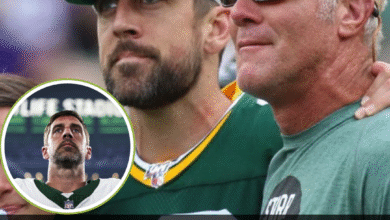“I Threw Up Blood Every Day” – Lane Johnson Exposes the Shocking Truth About Mental Health !
OPINION: This article may contain commentary which reflects the author's opinion.
In a sport built on strength, aggression, and silence, Lane Johnson chose to speak out.
The Philadelphia Eagles offensive tackle, a 3-time Pro Bowler and Super Bowl champion, shocked the sports world when he revealed the brutal toll mental illness had taken on his life. In a 2021 interview with Jay Glazer on FOX Sports, Johnson described living with anxiety and depression as feeling like he was “in hell for a long time.” But what truly stunned fans and fellow athletes alike was his confession that the stress had become so unbearable, he began vomiting blood on a daily basis.
“I threw up blood every day,” Johnson said plainly. “My hands would shake. I didn’t want to go to practice. I didn’t want to talk to anybody. I didn’t want to be here.”
This wasn’t just about football. It was about survival.

A Hidden Battle Since College
Johnson’s struggle with mental health didn’t begin in the NFL. It started in college but was buried beneath the expectation that athletes must always be composed, invincible, and ready to perform. Like many players, Johnson masked his symptoms for years, afraid of being labeled weak in a league that often equates vulnerability with failure.
He kept pushing, ignoring the warning signs, until his body could no longer hold it in—literally.
“There were times I thought I was losing my mind,” he said. “I’d be so anxious before games I’d vomit, not just from nerves but from pure psychological stress. I was breaking down, but I didn’t know how to stop.”
The NFL’s Unspoken Code of Silence
Johnson’s honesty pierced through a culture that rarely allows men, let alone professional athletes, to show emotional pain. In the NFL, toughness is glorified. Pain is played through. And mental health? It’s barely mentioned in locker rooms built on bravado.
“I was ashamed,” he admitted. “In this league, you don’t talk about this stuff. You just don’t. You keep your mouth shut, take your meds, and hope nobody notices.”
But the more Johnson suffered in silence, the more dangerous his internal world became. At one point, he took a break from the team mid-season to address his mental health. It was a decision that caught fans off guard but later became a turning point in changing how the league talks about psychological wellness.
The Ripple Effect
Lane Johnson’s decision to go public didn’t just change his life—it empowered others. Teammates reached out. Strangers messaged him with stories of their own. Other NFL players began acknowledging their struggles too. Suddenly, one man’s vulnerability sparked a wider conversation.
Johnson has since partnered with Kooth, a mental health platform that provides free counseling services for young people in Pennsylvania. His work now extends far beyond the field. He wants to make sure no teenager, no future athlete, suffers alone the way he once did.
“You don’t have to wear a mask,” Johnson told a group of students during a recent speaking event. “You don’t have to be okay all the time.”
Redefining Toughness
Perhaps Johnson’s most powerful contribution isn’t in his stats or accolades—but in how he’s helping redefine what it means to be strong.
“Toughness isn’t pretending you’re fine,” he said. “It’s facing your demons. It’s asking for help when everything in your brain is telling you not to. That’s what saved me.”
In 2025, Johnson is not only still playing at a high level—he’s become one of the league’s most important voices on mental health. Through advocacy, honesty, and raw courage, he’s helping rewrite the narrative of what it means to be a warrior, both on and off the field.
Because sometimes the strongest move isn’t a pancake block or a blitz pickup.
Sometimes, it’s telling the truth—even when it hurts.



